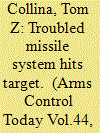|
|
|
Sort Order |
|
|
|
Items / Page
|
|
|
|
|
|
|
| Srl | Item |
| 1 |
ID:
130347


|
|
|
|
|
| Publication |
2014.
|
| Summary/Abstract |
The recently unveiled budget for the Defense Department's Missile Defense Agency (MDA) focuses on restoring confidence in the Ground-Based Midcourse Defense (GMD) system while keeping other aspects of the Obama administration's ballistic missile defense plans moving forward. The administration's missile defense budget request for fiscal year 2015 came in at $8.5 billion, including $7.5 billion for the MDA, representing a stable funding level compared to previous years despite cuts in other parts of the defense budget. Congress appropriated $7.6 billion for the MDA for fiscal year 2014.
In the March 4 press conference announcing the budget, MDA Director Vice Adm. James Syring said that the MDA will invest approximately $100 million to "initiate the redesign" of the Ground-Based Interceptor (GBI) kill vehicle, the part of the interceptor designed to seek out and destroy an incoming missile with a kinetic impact. A separate line item of around $26 million is devoted to "common kill vehicle technology," which will be used to "breed the technologies and improvements" for the GBI kill vehicle and potentially other interceptors such as the Standard Missile-3 (SM-3), Syring said. The GMD system has not had a successful intercept test since 2008, and the two currently deployed versions of the GBI kill vehicle, the CE-I and CE-II, have failed to intercept targets in the three tests since then. Frank Kendall, undersecretary of defense for acquisition, technology, and logistics, said in recent remarks that the GBI system suffered from "bad engineering" due to an accelerated deployment schedule.
|
|
|
|
|
|
|
|
|
|
|
|
|
|
|
|
| 2 |
ID:
129132


|
|
|
|
|
| Publication |
2014.
|
| Summary/Abstract |
The Defense Department's chief weapons tester called in January for the redesign of a key component of the U.S. system intended to intercept long-range missiles launched from North Korea or Iran, raising questions about the department's plans to expand the current system. J. Michael Gilmore, the Pentagon's director of operational test and evaluation, wrote in his annual report, released Jan. 29, that recent test failures of the U.S. ground-based interceptor (GBI) system raise concerns about the system's reliability and suggested that the missile's exoatmospheric kill vehicle (EKV) be redesigned to assure it is "robust against failure." Echoing Gilmore's view, Frank Kendall, undersecretary of defense for acquisition, technology and logistics, told a Feb. 25 conference in Washington, "We've got to get to more reliable [missile defense] systems." Merely "patching the things we've got is probably not going to be adequate. So we're going to have to go beyond that," he said. The EKV plays a central role in the missile defense mission. It is lifted into space by a booster rocket and then uses its onboard sensors to locate an incoming enemy warhead and destroy it on impact. U.S. officials have compared the task to hitting a bullet with another bullet.
|
|
|
|
|
|
|
|
|
|
|
|
|
|
|
|
| 3 |
ID:
132788


|
|
|
|
|
| Publication |
2014.
|
| Summary/Abstract |
The problem-plagued missile defense system designed to protect the United States from potential attacks from North Korea and Iran successfully intercepted a target missile last month, clearing the way for the Obama administration to move ahead with its plans to expand the system.
In the June 22 test, a ground-based interceptor (GBI) missile launched from Vandenberg Air Force Base in California collided with an intermediate-range ballistic missile target launched from the Army's Kwajalein Test Site in the Marshall Islands, according to a Missile Defense Agency (MDA) press release.
|
|
|
|
|
|
|
|
|
|
|
|
|
|
|
|
|
|
|
|
|